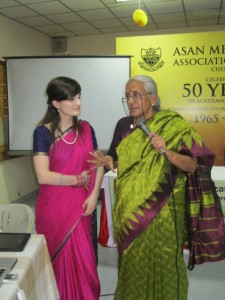It was a “conscious decision” for Sarah Farnand to specialise in the field of special education. A Fulbright-Nehru Scholar and English Teaching Assistant (ETA), US-India Educational Foundation (USIEF), she recalled that she was just a kid “when I used to baby-sit my cousins suffering from Autism and Down’s syndrome.” She grew up helping her cousins and others suffering from similar problems.

‘Connect,’ a workshop held at Asan Memorial School, Chennai, enhanced the knowledge of teachers of students with special needs with a detailed study on 13 categories for Special Education. Organised by the Rotary Vocational Training Team, D 3230, and sponsored by the Asan Memorial Educational Institutions, the programme had more than 60 teachers from mainstream schools across Chennai. The programme was moderated by Sarah.
“The sessions would help teachers to identify a special child in a classroom and implement a lesson plan for the future that would make learning fun and interactive,” she said. Included were hands-on activities on five of the main special education classifications— Specific Learning Disability, Speech or Language Impairment, Other Health Impairments, Emotional Disturbance and Autism.
Addressing the meet DGN Natarajan Nagoji said that most of us need to change our attitude towards special children. Pointing out to the Indian classroom tradition of learning by rote, Rtn Vasanthi Ranganathan said that “teachers make this habit mandatory by marking the answers and having the student memorise them,” failing which “no marks” are given to the students. “Only when you write in your own words can you learn. We need to change this system, we need to change ourselves,” she added.
While countries like US and UK have a specialised system in place to evaluate and re-evaluate special children, in India there is a lot more work to be done. A teacher from Chennai Public School remarked, “We need to adapt to a system where there would be no need to use a red pen.” Janaki Balakrishnan of Nav Jyothi Trust said, “There is no provision for a speech therapist and only very few schools have a psychologist.” So how does one catch them young and reach out to them on time? “Early intervention is most important,” she said. Another major problem was “restricting students to a subject beyond their cognitive capacity which is substantially lowering their achievements,” said another teacher.

Sarah feels that including the special needs programme in the curriculum at college level for prospective teachers would provide them with enough exposure to manage a special child. It is required that the teacher “sets a clear expectation and rewards the smallest of the child’s achievements,” she adds.
Shyamala Jeyaprakash, General Secretary, Asan Memorial Educational Institute said, “People have been very insensitive to special children — especially in India.” But the Founder of the institution and her father A K Gopalan “wanted to provide education to each and every child and unconsciously set the foundation of what is today a tradition of the school,” she added. Suma Padmanaban, Principal of the school said, “Children with disabilities have their classrooms on the ground floor to make it easy for them to move around. Assistance for special education is provided by Madras Dyslexia Association. There is nothing like reservation of seats for students with special needs … it’s a tradition.”





